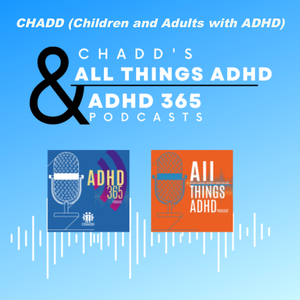
ADHD Podcasts
CHADD
CHADD’s podcasts—ADHD 365 and All Things ADHD
- 22 minutes 28 secondsApoyando a las Familias Latinas: Navegando el TDAH y TOD en Niños Parte 2En este episodio, contamos nuevamente con la terapeuta Kathy Argueta. En esta segunda parte, hablamos sobre estrategias prácticas para manejar el TDAH y el TOD en niños, con un enfoque en prácticas culturalmente relevantes para familias latinas. Los temas incluyen cómo equilibrar la crianza tradicional con terapias modernas, fomentar una comunicación abierta, crear un ambiente de apoyo en el hogar y acceder a recursos profesionales y comunitarios. También compartimos consejos para abogar por los hijos, avances prometedores en la investigación y cómo los padres pueden mantenerse informados e involucrados en el progreso de sus hijos.
English TranslationSupporting Latino Families: Navigating ADHD and ODD in Children Part 2
In this episode, we discuss practical strategies for managing ADHD and ODD in children, with a focus on culturally relevant approaches for Latino families. Topics include balancing traditional parenting with modern therapies, fostering open communication, creating a supportive home environment, and accessing professional and community resources. We also cover advocacy tips, promising research developments, and ways for parents to stay informed and involved in their child’s progress.
20 December 2024, 9:00 am - 23 minutes 24 secondsApoyando a las Familias Latinas: Navegando el TDAH y TOD en Niños Parte 1
En este episodio, exploramos los desafíos y fortalezas únicos dentro de la comunidad latina al apoyar a niños de 2 a 12 años con TDAH (Trastorno por Déficit de Atención e Hiperactividad) y Trastorno Oposicional Desafiante (TOD). Nuestra terapeuta invitada, Kathy Argueta, destaca cómo valores culturales como los fuertes lazos familiares, el apoyo comunitario y las creencias espirituales pueden desempeñar un papel crucial para ayudar tanto a los padres como a los niños a enfrentar estas condiciones. Enfatizamos la importancia de reconocer los signos y síntomas de TDAH y el TOD, fomentando la comprensión y la aceptación, y abordando estos diagnósticos con compasión. Aunque este episodio se centra en generar conciencia y reflexión, también ofrece ideas sobre cómo las prácticas culturales existentes pueden impactar positivamente a los niños y sus familias. ¡No te pierdas las estrategias específicas que compartiremos en el próximo episodio!
English TranslationSupporting Latino Families: Navigating ADHD and ODD in Children Part 1
In this episode, we explore the unique challenges and strengths within the Latino community when supporting children ages 2 to 12 with ADHD (Attention Deficit Hyperactivity Disorder) and ODD (Oppositional Defiant Disorder). Our guest therapist, Kathy Argueta, highlights how cultural values such as strong family ties, community support, and spiritual beliefs can play a crucial role in helping both parents and children navigate these conditions. We emphasize the importance of recognizing the signs and symptoms of ADHD and ODD, fostering understanding and acceptance, and addressing these diagnoses with compassion. While this episode focuses on raising awareness and reflection, it also offers insights into how existing cultural practices can positively impact children and their families. Don't miss the specific strategies we will share in the next episode!
11 December 2024, 9:00 am - 18 minutesPreparing Students with ADHD for College
In this episode of ADHD 365, educational consultant Judy Bass delves into the unique challenges faced by high school and college students with executive function difficulties, particularly those with ADHD. Bass, an internationally recognized expert in college planning and preparation for students who learn differently, shares valuable insights on how these students can overcome common obstacles such as time management, organization, and prioritization. She discusses the differences between high school and college regarding accommodations, emphasizing the importance of early preparation and self-advocacy.
Bass also provides practical strategies parents and educators can use to support students in developing independence and transitioning successfully to college life. With a focus on identifying the student’s strengths, this episode offers encouragement and actionable advice for navigating the path to academic and personal success.
30 October 2024, 8:00 am - 31 minutes 42 secondsBoosting Brain Health in Adults with ADHD: Insights and Strategies
In this episode of ADHD 365, neuropsychologist Brandy Callahan discusses the relationship between ADHD and brain health, especially as individuals age. An expert in cognitive aging and brain health, Dr. Callahan, explains how over time, ADHD can have an impact on memory, executive function, and overall cognitive abilities. She highlights the importance of managing stress, sleep, and vascular health, as well as the potential benefits of lifestyle changes such as regular exercise and social engagement.
Dr. Callahan also touches on the double challenge faced by adults with ADHD, especially women, who may experience both aging and ADHD-related cognitive difficulties. She shares valuable insights into the emerging research on ADHD and brain health, practical strategies for supporting brain health, and the role of mindfulness, sleep hygiene, and social interaction in maintaining cognitive function.
Resources for Maintaining Brain Health with ADHD
- National Institute on Aging
Offers comprehensive resources on aging and brain health. - Alzheimer’s Association
Provides excellent information on brain health and aging, particularly related to Alzheimer's disease. - Mayo Clinic
Specialized clinics with valuable resources on brain health. - Family Doctors, Psychiatrists, and Psychologists Personalized advice and recommendations for brain health, particularly valuable as they can consider individual health and family history.
- LIBRA Lab (Dr. Brandy Callahan’s research group)
For more information on research into ADHD and brain health, visit: www.libralab.ca.
26 September 2024, 8:00 am - National Institute on Aging
- 36 minutes 41 secondsCollege Bound: Preparing Students with ADHD for the Next Big Step
The transition from high school to college is a significant challenge for any student, but for those with ADHD and other learning disabilities, the shift can be even more daunting. In this episode of ADHD 365, we spoke with Elizabeth Hamblet, a learning disabilities consultant with over two decades of experience, about how students who learn differently can successfully navigate the college environment.
Hamblet shares insights on how college differs from high school for students with learning disabilities, the types of accommodations available, and the importance of developing independence before starting college. She emphasizes the need for proper documentation and offers strategies for selecting the right college. She also discusses how parents and educators can support students through this critical transition. With practical advice and a focus on empowerment, this episode provides valuable resources for students and families who are preparing for the college journey.
19 September 2024, 9:00 am - 18 minutes 14 secondsUnderstanding Stimulant Misuse Among College Students (All Things ADHD)
It is becoming increasingly common for college students to misuse prescription stimulants meant to treat ADHD. What factors drive this misuse, and how can it be addressed?
In this episode, Dr. Kevin Antshel, a licensed psychologist and professor of psychology at Syracuse University, discusses the primary motivations behind stimulant misuse. He identifies high-risk groups and discusses the awareness of counterfeit drugs among students. Dr. Antshel also discusses ways to reduce ADHD medication misuse, including strategies for preventing drug diversion and educating parents.
1 July 2024, 9:00 am - 15 minutes 10 secondsQué le pasa a los padres cuando escuchan que sus hijos tienen TDAH? (All Things ADHD)
En este episodio de Todas las cosas TDAH podcast titulado “Qué le pasa a los padres cuando escuchan que sus hijos tienen TDAH?”. Los presentadores Tamara Schlez y Miguelina Suero de la organización El Futuro hablan sobre cómo se sienten los padres cuando descubren que su hijo tiene TDAH. Comparten historias personales y hablan sobre el torbellino de emociones que los padres experimentan cuando reciben esta noticia. Hablan sobre problemas culturales y estigma en la comunidad latina en relación al TDAH y cómo los padres pueden encontrar un equilibrio entre los valores tradicionales y las necesidades de sus hijos. Discuten los desafíos que enfrentan los padres al encontrar apoyo y recursos para la educación y el comportamiento de sus hijos. Tami y Miguelina brindan estrategias y recursos para ayudar a los padres a sobrellevar esta situación y abogar por sus hijos, con el objetivo de crear una comunidad donde los padres puedan hablar y aceptar el TDAH.
14 February 2024, 10:00 am - 22 minutes 2 secondsHealthy Eating and Meal Planning w/ ADHD (ADHD 365)
Like many adults with ADHD, you may struggle with symptoms that create barriers to eating a healthy diet. Do you turn to convenience foods, especially when you’re busy? Are you bothered by stress eating, chaotic food shopping, or kitchen disorganization? The good news is that you CAN take charge of meal planning!
Our guest in this episode is Kim Arrey, a registered dietitian nutritionist. She offers practical strategies tailored for people with ADHD, while giving guidelines for healthy eating and meal preparation. She also explains how developing good habits will improve your life.
31 January 2024, 9:37 pm - 34 minutes 40 secondsCultivating a Meditation Practice (ADHD 365)
How can cultivating a meditation practice help people with ADHD to manage symptoms and improve their quality of life?
Our guest for this episode is Adam Coutts, a meditation teacher who discovered that he had ADHD as an adult. He explains mindfulness and meditation practices and describes their benefits for individuals with ADHD. He also talks about how to ease into a meditation practice and develop strategies for meditating effectively even while experiencing the symptoms of ADHD.
Click here to learn more about how to start a meditation practice: https://intromeditation.com/Wordpress/resources-for-beginner-meditators/
1 November 2023, 9:00 am - 24 minutes 46 secondsRetirement and Estate Planning for Adults with ADHD (ADHD 365)
Adults with ADHD often experience difficulties with navigating post-retirement life without the structure and the support offered by their workplace. Many find estate planning especially challenging.
In this episode, Rick Webster, the founder and CEO of Rena-Fi, shares his expertise on how you can organize and manage your wealth-building journey and retirement life. He outlines ways to avoid the pitfalls of financial planning and discusses how to build a professional and peer support network, handle the estate planning process, and create an ideal post-retirement lifestyle.
Learn more about how to holistically manage your finances and ADHD here: https://www.renafi.com/
18 October 2023, 9:00 am - 53 minutes 59 secondsADHD in Adults at Midlife (ADHD 365)
While most of the available information about ADHD deals with how it affects children and teenagers, we know it is a lifelong condition. How does ADHD affect people who are age fifty and older? Why are diagnoses increasing in this age group? What special challenges do they face, and how can they improve their daily lives?
Our guest for this episode is psychologist Kathleen Nadeau, founder of the Chesapeake Center and author or coauthor of more than a dozen books on ADHD. She discusses what ADHD looks like in older adults, the ways ADHD is more challenging for women, what to expect if you pursue a midlife diagnosis, and more. She also shares a few simple steps you can take to improve your quality of life with ADHD.11 September 2023, 9:00 am - More Episodes? Get the App
Your feedback is valuable to us. Should you encounter any bugs, glitches, lack of functionality or other problems, please email us on [email protected] or join Moon.FM Telegram Group where you can talk directly to the dev team who are happy to answer any queries.
 Beautifully Complex
Beautifully Complex
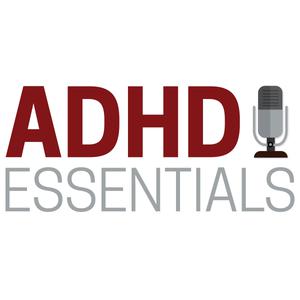 ADHD Essentials
ADHD Essentials
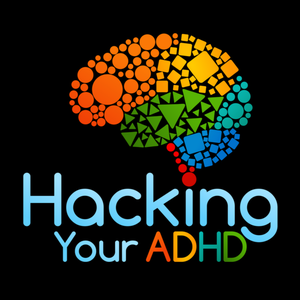 Hacking Your ADHD
Hacking Your ADHD
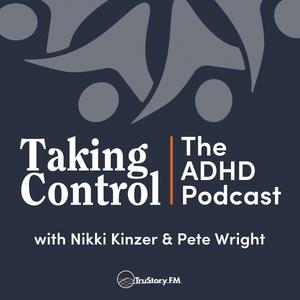 Taking Control: The ADHD Podcast
Taking Control: The ADHD Podcast
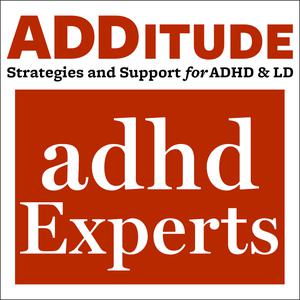 ADHD Experts Podcast
ADHD Experts Podcast
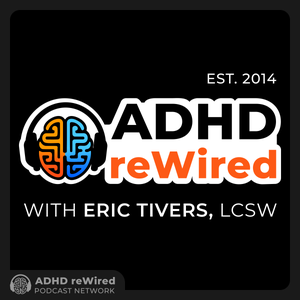 ADHD reWired
ADHD reWired